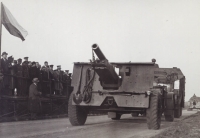Our people volunteered to join the Czechoslovak army We were Czech patriots
Rudof Veltruský was born November 10th 1920. Together with many other Czechs from Volyně he joined Svoboda´s Czechoslovak army after the Volyně region had been liberated by the Red Army. He was in the army for about a year, as a telephone operator and artillery soldier in a heavy howitzers unit he experienced intense fighting at Jaslo and then the campaign into Slovakia, all without having gone through any proper training. After the war he did not return to Ukraine, he stayed in Czechoslovakia.
